PALMERSTON
The linguistic legacy
A language enigma
The legacy of Palmerston's founding father, William Marsters lives on not only in his descendants but also in the way some - particularly the more elderly - still speak. Journalists, academics, writers and casual visitors to Palmerston have remarked down the years about the distinctive dialect of the islanders which harks back to Marsters' origins in England. It's been described as "an old Midlands drawl". William told crew on a number of passing ships that he was a Birmingham man, although other writings say he was born in Leicestershire. According to linguistics experts, the accent most closely resembles that of Gloucestershire - a county further south west. But they also say that, despite the incredible isolation of the island, the accent is gradually fading away through contact with the wider world and other "outside influences", including video recorders, DVDs and the internet!
I'm a journalist, not an academic or linguistics expert and many of those who've written about the accent are similarly not experts, but their observations are, in my view, still worth sharing. This is original research so if you want to reuse it, please attribute it to cookislands.org.uk
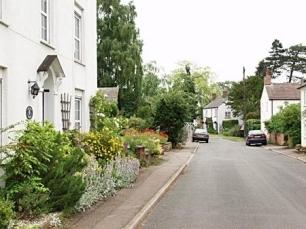

This is the main street today in the sleepy little English parish of Misterton with Walcot in Leicestershire which for many years was believed to be the birthplace of Richard Masters as he was known then (no "r" in the name). And it's thought the accent of this area and the towns and villages around it that William (as he became) took with him to Palmerston. But others, including Marsters himself, say he was Birmingham man and the accent is from that area. That city is about 59 kms (37 miles) from Misterton
"Reminiscent of the South West"
The first mention I've found about the unique accent is by Ralph Stock in his book 'The Cruise of the Dream Ship' first published in December, 1921 and it's a brief one. Remarking on the islanders, he says:
"They read, write and speak English, this last with an accent vaguely reminiscent of the south-west of England"
"AUTHENTIC WARWICKSHIRE"
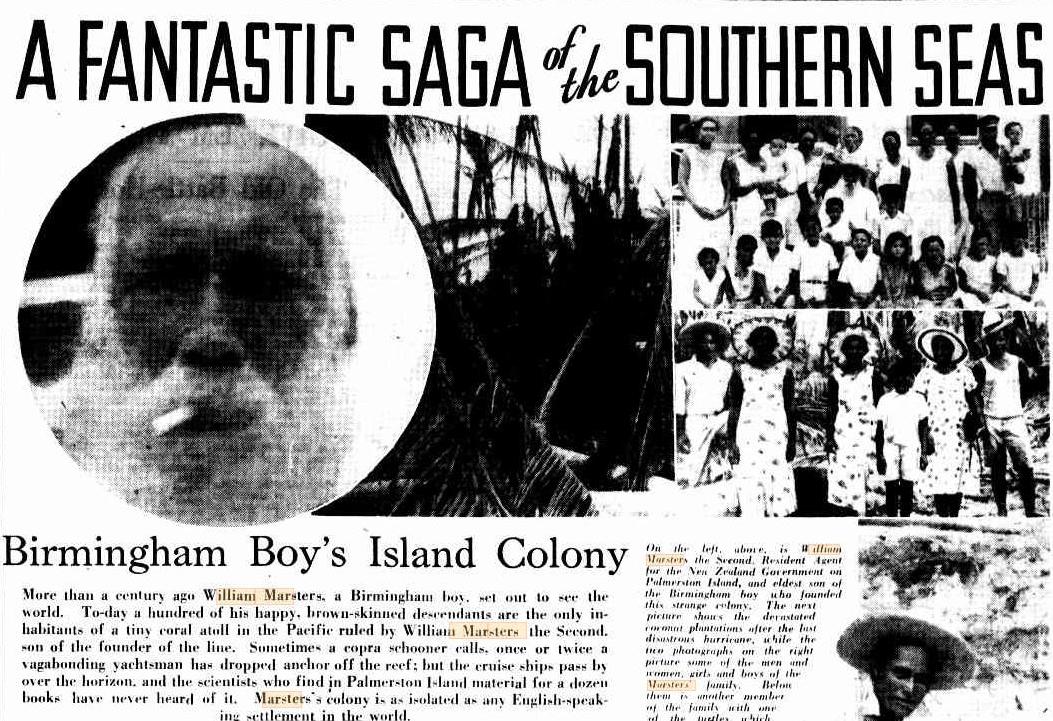
The Sydney, Australia newspaper, 'The Sun' published a story in May, 1935 about a meeting between its reporter RK Palmer and William Marsters the second. Palmer places the accent firmly in the Midlands of England, and Marster's origins to Birmingham not Leicestershire. He recalls the way William's son spoke:
"Stay and hawd the bawt, lads," he commanded. That accent was the authentic Warwickshire of a century ago. William the First and his townsmen used it, but to-day it Is spoken only on Palmerston Island, where it has survived through generations of mating with Polynesians.
A CURIOUS PROVINCIAL ENGLISH
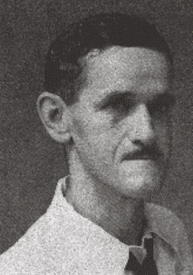
American author, Robert Dean Frisbie spent much of his life in the South Pacific and writes about Palmerston in his 1944 book, 'The Island of Desire'. Referring to Takataka, a crewman on his friend's boat, he says:
"He speaks the curious provincial English that was brought to Palmerston originally by William Marsters..."
And he gives this example:
"Yas," Takataka, will say, "I smokes cigarettes; also I chaws tobaccer." And: "I tromped to my lond and I clombed a tree".
"QUITE DIFFICULT TO FOLLOW"
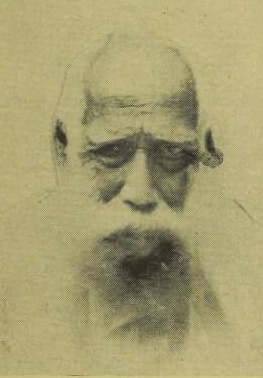
Reporting on the death of William Marsters II (pictured here) in its October, 1946 edition, 'Pacific Islands Monthly' observed:
"A notable feature of the Marsters clan is their quaint, old Midlands English speech. It is spoken with a slow drawl, and is quite difficult to follow at first acquaintance."
ARCHAIC WITH A "DASH OF THE SOUTH SEAS"
Dr Tom Davis in his 1955 book "Doctor to the Islands" (Published by Michael Joseph, London) said he was delighted to find the people of Palmerston "spoke a language all of their own". He said "everyone by the name of Marsters "spoke archaic seafaring English with an added dash of the South Seas". He gave this example:
"Mrs Taam, woulds't lake to coom oop maowntin'? Be goom, s'nota reel maowntin'...T'e mouwntin's not but six feet 'igh, but 'tis a graand place where t'e winds blow. Coom h'aft and look you".
A footnote: Tom went on to found the Cook Islands Democratic Party in 1971 and was twice Prime Minister.
A SLOW DRAWL
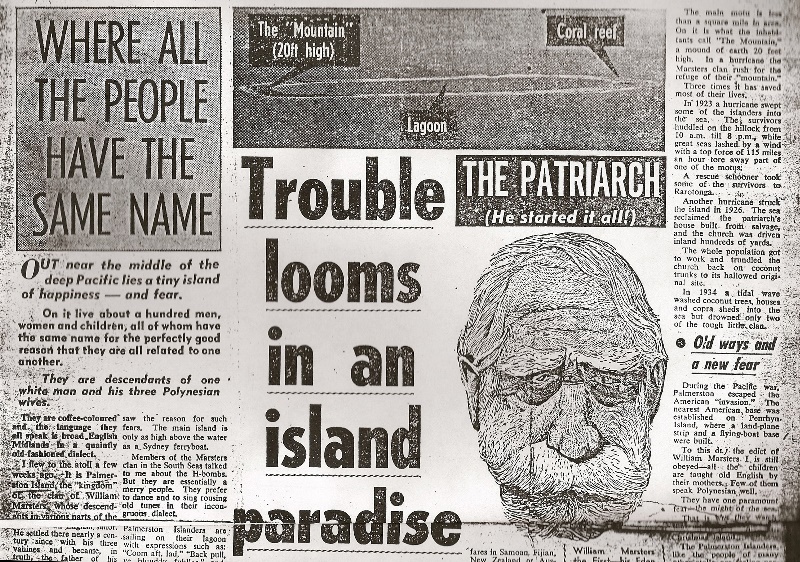
Australian journalist, Jack Percival visited Palmerston in 1956 to talk to islanders about atomic testing in the South Pacific. He wrote:
And he attributed that to founding father, William...
"...the language they all speak is broad English Midlands with a quaintly old fashioned dialect"
"Marsters established his own school and insisted from the start that every child must learn English. That is why the dark skinned descendants now speak old Midlands with a slow drawl"
He also remarked on some 'colourful' language that harked back to the seafaring origins of their ancestor...expressions like "Coom aft lad" and "B----- the sharks! Into the bluudy sea with them".
QUAINT AND DISTINCTIVE
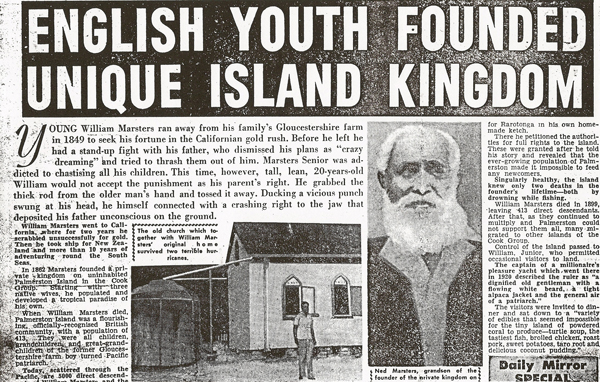
A special feature in the UK's 'Daily Mirror' newspaper in 1959 told the William Marsters story. Within it, the writer observes:
"To this day, all Marsters speak with a quaint, old fashioned vocabulary and a distinctive Gloucestershire accent"
Meanwhile, a study paper proposal from the University of Victoria, British Colombia of 1982 explains that
"...the modern population speaks with an old English (Gloucestershire) accent. Due to the isolation, the Palmerston dialect contains many words that have long been out of use elsewhere".
BROAD WEST COUNTRY
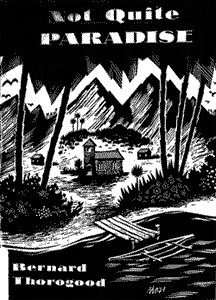
English missionary, Bernard Thorogood worked in the Islands in the 1950s and recalls his surprise at hearing English spoken by the Palmerston islanders. In his book "Not Quite Paradise" (London Missionary Society, 1960), he says:
"Everyday speech is a queer brand of English, spattered with archaisms"
Although he doesn't speculate about the type of accent, one particular example he gives includes a phrase that he describes as broad English West country. Older folk, recalling some of the terrifying hurricanes of the past tell him:
"When the seas came roaring across the islet, the cry was 'Oop the marntain', and up the mountain they all went."
"A SING-SONG VOICE"

Another English missionary, John Sturney visited what he called "the one-family island" in the early 1960s and was also struck by the distinctive language
"They all speak English using quite a lot of old nautical terms and most of them speak with what I suppose must be a Gloucester accent, although it sounds to me very much like a Welsh, sing-song kind of a voice"
From John Sturney's letters home, as published in the book "Legacy - A Missionary's life - Letters from the Cook Islands" by Simeon Sturney with Faye Porter. Sarah Grace Publishing, 2025
"BASIC BASIC ENGLISH"
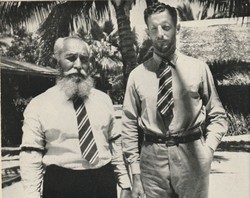
Royal Navy Commander Victor Clark was shipwrecked on Palmerston during a remarkable 48,000 mile voyage recounted in his 1960 book "On The Wind of A Dream. The Saga of 'Solace'" (Hutchinson and Co Ltd, London, 1960) . He's pictured here on the right with island leader, Ned Marsters. a direct descendant of founding father, Wiliam. Of the Islanders speech, Clark observed:
"Their isolation and the passage of time has produced what might be described as a 'basic basic English' of quaint character and rustic accent perhaps handed down from old William. Many words have become corrupted and some appear to be original, but on the whole their talk is quite easy to follow and provided I used simple words, I was understood by them"
WHAT DO THE EXPERTS SAY?
A unique atlas of languages* includes a detailed study of Palmerston English. One of the world's leading linguistics experts, Sabine Ehrrhart- Kneher visited the island in 1992 and noted:
"The Palmerston people are proud to speak 'the most British English' of the Cook Islands and they try to limit the number of Maori words in everyday life, especially if there is an English equivalent....A great number of English origin are either historical or dialectal remnants of the first William's speech..."
She describes traditional Palmerston English as having "a very special chanting melody" with characteristics of the accent of Gloucestershire in England. But she also notes that it has evolved over the generations due to increased contacts with Rarotonga English, New Zealand English...and due to the videos that are watched almost every night in all the houses!
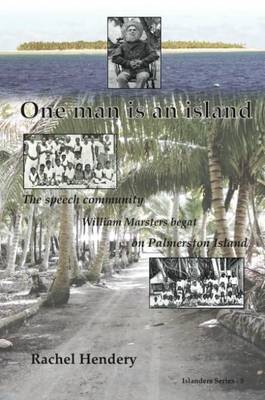
Linguistics expert Dr Rachel Hendery of Western Sydney University in Australia spent time on the island in 2012 and also noted changes over the preceding 20 years in the language because of outside influences and contact with New Zealand. Her analysis** supports a view that Marsters came from the Midlands of England - "probably Leicestershire or Birmingham", she says. In her 2015 book, "One man is an island" she summarises her view:
"A simplification of the Palmerston accent is to say that the vowels sound like something from Northern England, while the consonants are more similar to the consonants used by Cook Islands Maori learners of English".
She also observes though that "there is a lot of variation in how people speak on Palmerston Island" and that the accent of some "sounds exactly like standard New Zealand English"
*"Atlas of Languages of Intercultural Communication in the Pacific, Asia and the Americas" volume II.I, Published by Walter de Gruyter, 1996
**Palmerston Island English: This research was supported under Australian Research Council’s Discovery Projects funding scheme (Project number DP110103714) . Also in "One Man is an Island The speech community William Marsters begat on Palmerston Island" by Rachel Hendery. Battlebridge Publications, 2015











